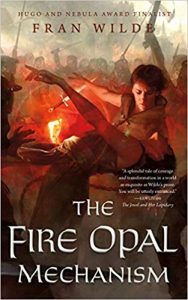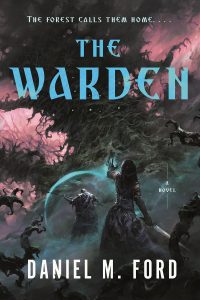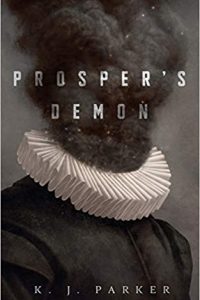Liz Bourke Reviews The Fire Opal Mechanism by Fran Wilde
 The Fire Opal Mechanism, Fran Wilde (Tor.com Publishing 978-1-250-19654-5, $14.99, 208pp, tp) June 2019. Cover by Tommy Arnold.
The Fire Opal Mechanism, Fran Wilde (Tor.com Publishing 978-1-250-19654-5, $14.99, 208pp, tp) June 2019. Cover by Tommy Arnold.
The Fire Opal Mechanism is billed as a sequel to an earlier novelette by award-winning author Fran Wilde (Updraft, Cloudbound, Horizon). That novelette was The Jewel and Her Lapidary, a work with elegant prose, a deeply compelling friendship between two young women, and an ambivalent – and ambivalently tragic – ending. The Fire Opal Mechanism doesn’t form anything like a direct sequel: it is set within the same world, but its main events take place centuries later.
Wilde sets her story within a dystopia of information control. The Pressmen value knowledge (by their lights) and the accessibility of knowledge. They’ve conquered all of the six kingdoms, feeding other people’s books to the press that prints their Universal Compendiums of Knowledge and magically alters those texts. (Wilde carries through a thematic argument between the value of the accessibility of information and the value of diversity in its production and dissemination throughout the text: this isn’t a shallow metaphor for “ebooks are eating the printed word!”)
Ania Dem is a librarian – in her own words, “a rumpled one” – at the last university standing (albeit not for long) in the kingdoms. The University of the Far Reaches is about to fall to the Pressmen, and Ania is trying to save some of her books. Trapped in her library while the Pressmen blow up the university around her, though, it starts to look like Ania won’t even be able to save herself.
Jorit Lee was training to be an engineer before she was branded a thief. She and her brother turned to thievery for real after that to survive, but the Pressmen killed him. She’s in the Far Reaches to try to loot enough to allow her to travel to one of the islands beyond the Pressmen’s reach. Trying to steal books from a library that’s about to be blown up may not be her best life decision, but it leads her to Ania Dem, and a strange clock with an ancient, mysterious jewel at its heart that catapults them both on a peculiar, staggered journey into the past.
Meanwhile, Pressman Xachar Oubliant just wants to be useful. This desire will see him serving the Great Press and the ever-hungry Midnight Emerald at its heart, but he doesn’t understand what it really is, or why and how it communicates with him for its own ends. The stories of the gems and their lapidaries have faded into myth.
Ania and Jorit discover – as they stagger about in the past, learning to trust and rely on each other and coming to understand the rise of the Pressmen and the Great Press – that the power in those old stories was real. The fire opal jewel at the heart of Ania’s clock is one of the last surviving gems. Ania and Jorit cannot change the past, only the future, but that will see them pit their own strength and power against the Midnight Emerald, and challenge the Pressmen’s control over information and knowledge.
The Fire Opal Mechanism shares with its predecessor a spare elegance of prose and a sharp eye for characterisation – though I find these older and slightly more world-worn protagonists more compelling than the youthful ones of The Jewel and Her Lapidary. It shares, too, a strong concern with connections between women, with their friendships and potential romantic connections, but while its ending is less ambivalently tragic, it is an ambivalent conclusion, one that raises more questions than it answers – especially given the framing device of the main characters’ testimony to a “commission on knowledge and loyalty” which opens several of the novella’s sections. What has changed and will change? Where do the characters go from here?
The Fire Opal Mechanism is less a traditional narrative arc than a mood, a movement, an argument on the nature and purpose of knowledge and responsibility. It’s compelling, but at times opaque. I pretty much love it.
Liz Bourke is a cranky queer person who reads books. She holds a Ph.D in Classics from Trinity College, Dublin. Her first book, Sleeping With Monsters, a collection of reviews and criticism, is out now from Aqueduct Press. Find her at her blog, her Patreon, or Twitter. She supports the work of the Irish Refugee Council and the Abortion Rights Campaign.
This review and more like it in the May 2019 issue of Locus.
 While you are here, please take a moment to support Locus with a one-time or recurring donation. We rely on reader donations to keep the magazine and site going, and would like to keep the site paywall free, but WE NEED YOUR FINANCIAL SUPPORT to continue quality coverage of the science fiction and fantasy field.
While you are here, please take a moment to support Locus with a one-time or recurring donation. We rely on reader donations to keep the magazine and site going, and would like to keep the site paywall free, but WE NEED YOUR FINANCIAL SUPPORT to continue quality coverage of the science fiction and fantasy field.






